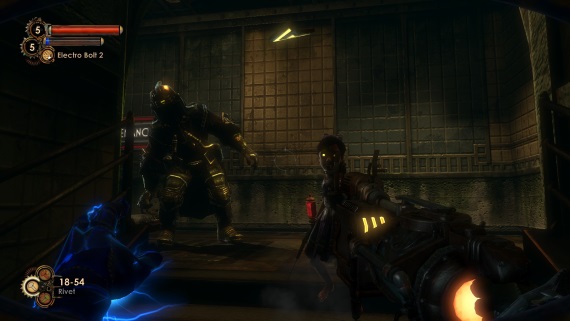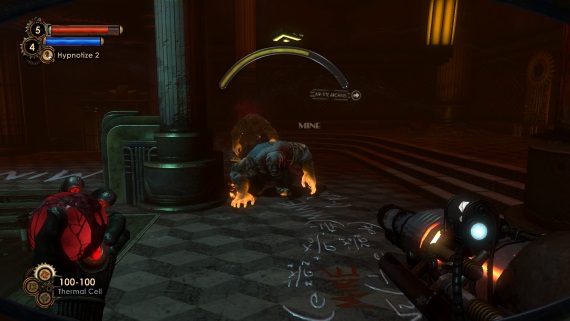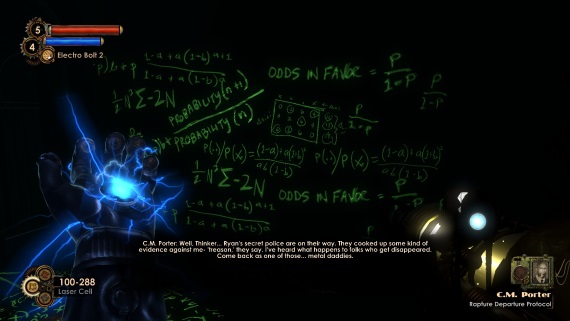28 Nov

It’s a Little Sister and a Lancer Big Daddy, if you can see them in the darkness of Rapture.
While considering whether or not to buy the DLC for BioShock Infinite, I realized that I’d never played Minerva’s Den even though I own it. It just slipped my mind somehow. So it duly went straight to the top of my priority queue.
- Wow, Rapture sure is dark compared to Columbia. Lots of creepy environmental effects too, like water splattering on your faceplate and clunks and thumps in the background. I think I would love to play a story-heavy adventure game set in Columbia but I sure prefer playing a survival horror combat-oriented game in Rapture. And aren’t the vibes and mechanics that can be traced all the way back to System Shock really about survival horror anyway.
- Okay, I finally admit that the combat system in here is actually rather bad. Not sure why I never quite saw it before but playing this on Hard difficulty makes it very obvious. Enemies have lots of health but almost never react to being hit so they are literally bullet sponges. So you either stand there and trade attacks with them, making it a battle of attrition, or you stun-lock them with a plasmid. I find it especially irritating how the end boss in this DLC has a truly ridiculous (and implausible!) amount of health. I think it would have been a better experience if I had played it on Normal difficulty.

Brutes now come in a fiery variant. Toasty!
- Still between options like gathering an army of security bots, hypnotizing enemies to be your buddies, hacking turrets and leading enemies into them, making traps with special ammo and plasmids etc., I still found combat to be very enjoyable and satisfying. The high level of challenge meant that I actually did need to resort to all these tactics to win. I loved that.
- I’m not enthusiastic about the level design either. You need to go in there to do something but you need this plasmid to unlock the door. But to get there you need this other plasmid to unlock that door. Can we just go back to Doom-style red and blue keycards please? And the final area is so obviously a boss battle arena.
- The story however is where this DLC truly shines. It’s modest in scope and deeply personal. This makes it easier to grasp, easier to write without losing the plot in convoluted turns and much more affecting emotionally. At the same time, it also has the personality and identity twist that is now a characteristic of the series and is very much a story about Rapture. Walking through the ending section of the game, it’s no wonder that this team went on to make Gone Home.

Complicated math equations everywhere. A mark of genius or insanity?
- One thing I noticed that the quality of the audio recordings you find is markedly higher than those in BioShock Infinite. The writing itself is better, with a story arc that is better defined and more understandable. But I also found that the overall sound design ensures that you actually can hear the logs clearly. Often in Infinite, I would activate a log only to hear Elizabeth or incidental dialogue talk over it. Here, all of the other environmental are very obviously muted while the log is playing, so they feel dramatic and have maximum impact.
The whole thing was more substantial than I’d expected so I can see this DLC garnered all of those praises. I found it an excellent experience and at the end you even get to leave Rapture for good on a positive note without descending into sentimentality. Just really solid work.
Written on November 28 2014 and is filed under PC Games.
You can follow any responses to this entry through the RSS 2.0 feed.
You can leave a response, or trackback from your own site.
Leave a Reply